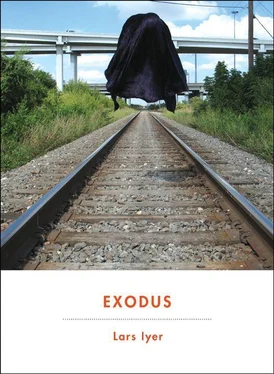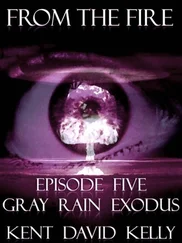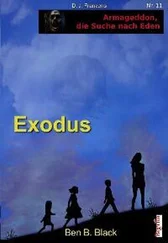‘ Here is a man who does not know shame ’, W. thought to himself. ‘ Not only this, he seems to encourage others to forget their shame ’. And soon W., too, pushed back his chair and took to Adam Ant dancing .
And our Polish hosts, who were so generous in organising a meal in our honour, sat by, smiling and drumming their fingers, perhaps wondering if there wasn’t a British tradition — a British philosophical tradition — of Adam Ant dancing at the beginning of a conference.
And when we sat down, breathless, faces flushed? When we pulled our chairs back to the table, ready for our sauerkraut and dumplings at the dinner held in our honour? W. felt a new kind of lightness , he said. A new dizziness . For what had he known, hitherto, of pure joy ? What had he known of the sense of abandonment that marks pure joy?
Henceforward, I blazed a trail ahead of him that he knew he’d have to follow. Henceforth, it was joy that sprang ahead of us — ahead of me , and drawing me on, and now ahead of him , too, and drawing him on — a kind of joy attached to nothing in particular.
It’s happening just as I predicted, W. says. The collapse of the universities. The collapse of civilisation. Don’t you realise how good we’re having it? I’ve always said to him. These are the best of times , I’ve said, over and again. You think this is bad? It’s going to get worse, much worse , I’ve told him, and I was right. Some idiots are savants, W. reflects. Like that guy in Rain Man .
The corpse of the university floats face down in the water, that’s what I always tell him, W. says. We’re poking it with sticks. None of us can believe it. Is it really dead, the university? W. asks me. Is that really its bloated, blue-faced corpse? Yes, it really is dead, and there it is, floating, face down, I tell him. There’s no point pretending otherwise, not anymore. The university is dead, and there is its corpse.
Oh, there are signs of life in the university, I tell W. It seems that it’s alive. But that life is the life of maggots, I tell W., devouring the substance of the university from the inside, living on its rotting.
The corpse of the university is a breeding ground, I tell W. The corpse is where Capital comes to lay its eggs. The university is that rotten place where Capital deposits its eggs …
Christchurch Meadows. This is the walk of death , we agree. You think you’re escaping Oxford, as you head out along the river, but really you’re only going more deeply into Oxford. It’s a city even the Situationist couldn’t redeem, W. says. You think you’re leaving it behind, all the nonsense, all the stuffiness, the whole stage-set let’s-pretend antiquarianism, W. says, but really you’re only confirming it. How many poor idiots like us have thought they could escape Oxford while in Oxford, W. says, only to find themselves more deeply immersed in Oxford than ever?
It’s part of the Oxford rhythm , the Christchurch Meadows walk, we agree. The way it grants you the illusion of freedom , only to draw you in more deeply. The way it seems to open the door, and make Oxford less like a prison. Imagine how many poor idiots like us have marched up the Cherwell, W. says. Up the fucking Cherwell, congratulating themselves on having escaped!
Meanwhile, Oxford is laughing at you. The Oxonians are laughing at you. The spires of the Oxford colleges are laughing at you, and you might as well kill yourself. In the end, we are the dupes of Oxford, we agree. We’ve been duped by it, thoroughly duped. We’re Oxford’s idiots. We came here because our confreres came here, because our annual conference is held here, because our society likes to borrow the prestige of Oxford, hiring out a college to let us play-pretend at being Oxonians.
We laugh at our confrères but we are as trapped as they are: walking through the meadows as they do, walking out along the river as they do, walking out of Oxford for a bit of fresh air as they do, really we’re only ever breathing in the foul air of Oxford as they do, W. says. We’re like all the other parasites in the rotting flesh of Oxford, W. says. Walking out in order to come back in, walking away in order to return: that’s the dreadful rhythm of Oxford, we agree.
But in the end, Oxford’s time will come. It is coming. Of course it is! The rough beast is slouching towards Oxford, too. For a time it will be permitted to continue, this façade of old England, this façade of study, this façade of research. But it is coming, the privatisation of thought, and not even Oxford will resist it.
‘After tragedy, farce’, W. says, remembering Marx. And after farce? This. Us. Christchurch Meadows.
Who are we amusing? Who laughs at our slapstick? — ‘Something in us doesn’t know that we’ve died’, W. says. ‘Something in us doesn’t grasp our destruction’.
Who’s going to finish us off? Why haven’t they done it already? For whom are we the insects that race around when a rock is lifted? Someone needs amusing, so they’re letting us live, W. says. Some idiot god, with drool running down his chin.
Our failure; again and again our failure. Why don’t we learn? Why do we never learn from our mistakes? But if we did learn? If we took, as our lesson, the failure of our efforts on a previous day and on a prior succession of days? If we saw our lives as what, in fact, they are: a series of grotesque mistakes, a catalogue of impostures and usurpations? W. shudders.
Why has it been left to him, rather than me, to face our disaster? I am a little more idiotic than he is, and therefore a little more forgetful. I can wake with a little more confidence in my labours; I can throw myself a little more obliviously into my studies (my so-called studies). And in that way, I throw myself ahead of him, too — ahead, and calling him after me by my power of forgetting, which is to say, my idiocy.
Why don’t I learn? W. asks himself. But he thanks God that I do not, and that I encourage him by my example.
‘You need a woman in your life’, says W. ‘Why haven’t you got a woman in your life?’ Even Salomon Maimon, the ragged philosopher , had a girlfriend, and he never washed! Even Blanchot, the famous recluse, had Denise Rollin, though their relationship was largely epistolary. ‘ Dear Maurice … ’; ‘Dear Denise … ’
W. tells me of the recently discovered love letters that Rosenzweig exchanged with the wife of his best friend. Margit Rosenstock — Gritli, as she was known — “ tore at his roots ”, Rosenzweig wrote. But what of Gritli’s husband? ‘ Eugen must know that he is the lord of our love, that it falls into an abyss if he turns away ’, Rosenzweig wrote to Gritli. ‘ Before him we have to be revealed … ’ They had to be revealed: there could be no secrets. Their love was so much more than mere adultery.
‘ My soul encircles you and loves you ’, Rosenzweig wrote to Gritli. ‘ This book I am now writing ’ — he was writing the central section of The Star of Redemption , which concerns revelation — ‘ belongs to you. It is not “ for you ” but — yours. Yours — as I am ’.
‘ Love is the binding of the human and the divine ’: that’s from The Star of Redemption , W. says. ‘ My experience of love, of being loved, my experience of God’s command to love another, is itself divine ’, that’s what Rosenzweig wrote, W. says.
But what of Rosenzweig’s friend Rosenstock, what did he think? And Rosenzweig’s wife, who Rosenzweig had married in order to set up a real Jewish household after his return to Judaism: what was her opinion?
Читать дальше












